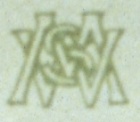William Stainton Moses
Early life and career
William Stainton Moses was an English clergyman, writer, and editor. He was born on November 12, 1839 and earned a Master of Arts degree at Oxford University. After serving as a preacher in the Diocese of Sarum (Salisbury) in the Church of England, he worked as a lecturer in philology at London University and as a Professor of Classics and English at the University College London. Rev. Stainton Moses became interested in Spiritualism and developed remarkable psychic abilities.[1]
Imperator
One of Stainton Moses' "spirit guides" was called “Imperator” (frequently designated in the as "+" in "The Mahatma Letters"). Imperator claimed to know nothing about "the Brothers", and therefore Moses did not believe in them.
Imperator's identity is not clear. In letter No. 38, Mahatma K. H. suggests that different entities communicated with Moses under that name, sometimes it being his own Higher Self, at other times one of the Adepts, and in other occasions some other entity or entities.
Mahatma Letters
Rev. Stainton Moses is mentioned in several of The Mahatma Letters to A. P. Sinnett. He also wrote one of the letters in that collection, addressed to A. P. Sinnett on November 26, 1881, in which he discussed about mediumship. It is letter number 38 in the chronological sequence (number 90 in Barker editions).
Writings
Rev. Stainton Moses became publisher and editor of the periodical Light. He wrote for spiritualistic and Theosophical journals under the nom-de-plume "M. A. (Oxon)"[2] reflecting his academic credentials, where Oxon. is an abbreviation for the University of Oxford (Latin name Universitas Oxoniensis).
The "Early Story of TS" was an article published in two parts in Light, July 9, 1892, pp. 330-32; and July 23, 1892, pp. 354-57. In this article Moses reviewed Olcott's Old Diary Leaves when they were first published in The Theosophist beginning with the March 1892 issue. Moses also published a transcription of eight letters that he received from Olcott during the years 1875-76. Some of the letters give Colonel Olcott's early views of Madame Blavatsky.[3]
Notes
- ↑ The International Theosophical Year Book 1938 (Adyar, Madras, India: Theosophical Publishing House, 1938): 202.
- ↑ The International Theosophical Year Book 1938 (Adyar, Madras, India: Theosophical Publishing House, 1938): 202.
- ↑ Available at Theosophical Society in America Web page [1] and at the Blavatsky Archives Web page. [2]

